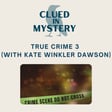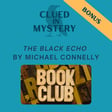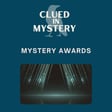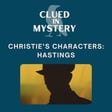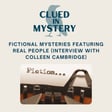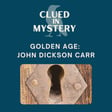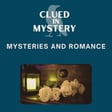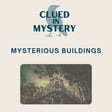Guest Introduction and Discussion on Storytelling Twists
00:00:10
Speaker
Welcome to Clued in Mystery. I'm Sarah. And I'm Brooke. And we both love mystery. Hi Brooke. Hi Sarah. I'm so excited. We have our first guest of the season today. I am very excited as well. And we're going to be talking about twists with Samantha Skoll. So I will briefly introduce her.
00:00:37
Speaker
A fan of the scary, mysterious, and suspenseful, Samantha Skall is the executive director of Thriller Fest, the co-founder of Shadows and Secrets Writing Retreats, a series of thriller mystery focused writing retreats in Salem, Massachusetts, most haunted hotel, and an author accelerator certified book coach who specializes in coaching mystery, thriller, and suspense authors from novel planning through the delightful hell that is revision. Her superpower as a coach is brainstorming twists without ground-up rewrites, and she recently released a standalone mini-course for blocked thriller writers, Find Your Final Twist.
00:01:12
Speaker
An enthusiast of homemade sourdough and cheese of all kinds, Sam is an agent and author who writes stories that keep her up at night and lives in the beautiful Pacific Northwest. So welcome, Sam. Thank you so much for having me, you two. This is such a pleasure to be here and I can't wait to talk about my most favorite subject.
00:01:32
Speaker
Oh, that is fantastic. And you know, I was getting my notebook out because as both as a reader and a writer, I am so excited about this topic. But then I just decided, no, we're just going to talk and I can re listen to this episode myself as many times as I want to.
Defining Twists and Red Herrings
00:01:50
Speaker
So to get us started, Sam, what is the difference between a twist and a red herring? And are they related in storytelling?
00:01:59
Speaker
ah So absolutely. So I like to think of a twist in a couple different ways. You can think of it either as a reveal of the villain's truth, like what's actually happening in the story. And sometimes it resonates if I describe it as a ah correction of a misassumption, right? So if you're moving through a story and you're the protagonist and you're making all these assumptions about what's actually going on, when you actually hit the truth, that is a twist because it's unexpected, right?
00:02:27
Speaker
red herrings are those assumptions, but they don't turn out to be the actual truth. And so they are related. And as authors, we want to build those in to misdirect the reader because, of course, we're coming at it from a totally different perspective to you know mess up the reader as they read and try to get them to think whatever we want them to think so that it becomes even twistier. But the protagonist is the person who is going to receive all of these clues throughout and make some assumptions. Some of them are going to be correct. Some of them are not.
00:02:55
Speaker
um the incorrect ones generally end up being red herrings right as they pursue the truth. ah Thanks for that um and definition, Sam. so What do you think makes a great twist?
Crafting Satisfying Twists
00:03:09
Speaker
So I personally love those twists where when as the reader you read them, you're like, oh my gosh, you know like I should have seen that coming and all the clues were there, but I didn't. And the the author just so beautifully guided me on this journey, but I don't feel like it came out of left field. you know like therere There are so many little clues in the book. And when I look back, it's crystal clear.
00:03:34
Speaker
But i you know i I just didn't see it coming. But when we don't have those like peppered clues throughout, it can feel less satisfying. And I think as an author, you know we all want to write satisfying novels where the readers read them and put them down at the end and say, where's the pre-order link for the next one? you know like How can I keep going with this person? Because they gave me such a lovely experience as a reader.
00:03:59
Speaker
does an author need to be someone who plots out their mysteries? Or can they be a discovery writer and still have great twists? What a good question. So I personally fall somewhere in the middle of that. I have worked with full plotters who have these beautiful, I could never do it myself, you know, 20, 30, 80 page outlines. And then I work with people who are like, absolutely don't come at me with that plotting stuff. You know, I need to discovery write the whole time. As a personal writer,
00:04:29
Speaker
I discovery write for the first probably 10,000 words to kind of figure out what I want to write about and what this story is. And then like I do with my my clients, I get us into sort of a very high level outline. So it ends up being no more than two or three pages. It's like scene by scene and I find the magic in that is that you know where you're going with who the villain is, what's actually going on, because you do have to know that when you're writing a mystery. You have to know quite a bit about what the actual story is underneath the surface, because the protagonist is the one receiving the that story. they don't you know They aren't generally the person who knows everything from the beginning, although of course you can reverse that. and
00:05:10
Speaker
you know, plus what ah heist movies are, right? It's like the reversal of all of that or, you know, ah heist plots. But as as you move through your story writing and as you move through writing itself, it is very possible to discovery, right, and find some new fun thing that comes up at like, you know, scene five or whatever.
00:05:29
Speaker
And then the way this outlining works, because it's so high level, is you can adjust from there, right? So you know what the villain's doing. You know kind of where you want to go. You have bumpers on how you're writing, but you're not so locked in. um I personally find that plotting to such an extent removes the joy for me, but every writer is so, so different. And so if plotting works for you, like by all means, right?
00:05:53
Speaker
And if you just want to discovery write, I would encourage those writers to sit down and write just a bit about who the villain is, what is actually going on in the story, what what actually happened, and then have your discovery writing be about how the protagonist receives all those clues.
00:06:10
Speaker
And I think that's the happy medium. I've found great success with this.
Reimagining Overdone Twists and Beta Reader Insights
00:06:14
Speaker
ah But of course, every writer is different. And some people listening are going to be like, nope, not for me. And you know, that's okay, too. But this is what I found works consistently. Oh, that's fantastic advice. So Sam, do you see some twists that are overdone? And is there a way to freshen tired twists?
00:06:38
Speaker
Yeah, absolutely. There's kind of a two parts to that question. So the overdone part, I think that when there are too many clues, this is what beta readers are for. So, you know, at a certain point, we as authors cannot see our own work clearly, right? We all get to that point where we're like, Oh my gosh, this is so obvious. Like, I just, and people are going to know from page one, what's going to happen. And that's because we have this viewpoint of knowing everything.
00:07:01
Speaker
So everyone feels that way. So if you, the writer, are feeling that way, that's totally normal. But as you give things to beta readers, I like to give my betas a series of very specific questions where it's like write down the page number of when you realize these things because you don't want to just give a beta like, did you like it? you know Because if they know you at all, they're going to lie to you because they love you. um Or they're going to be super harsh, and there's not really like very much middle ground there. And neither one of those is particularly helpful. So if you ask,
00:07:31
Speaker
you know, when did you figure out who did it? um That page number is super helpful. I also include like, when did you get bored? When were you confused? I guess this is the main three. So I think the big thing with twists is it goes along with tropes, right? So in mysteries, you know, there's a lot of, I mean, the classic one is like the butler did it, right?
00:07:51
Speaker
And if you have a locked room mystery in a big mansion or whatever, everyone's going to be like, oh, yeah, the butler did it because of Clue. And there's just, ah you know, Agatha Christie, like there's just so many things that already exist out there in the world. And so as an author, think about the whole library of mysteries that exist and think about what you've seen before and play with that.
00:08:12
Speaker
you know So if you have a butler in your mix of cast of characters, have it look like they did it. And then have them not do it. And then maybe at the very, very end, that final twist, it turns out they did. But they knew, because everyone was in this story together, that it looks like they did it. So they took extra so extra care to make sure you know it can go around and around like that. But I think that's how you make something fresh is by messing with the reader expectations and understanding that people are going to come in with their own knowledge of the genre.
00:08:42
Speaker
and what they think is going to happen. Oh, this is wonderful advice, Sam.
Twists in Modern Fiction and Their Impact
00:08:47
Speaker
um I feel like i'm I'm, like Brooke, I'm going to have to re-listen to this several times. Thanks so much. Yeah, I just, I absorb, I absorb mysteries and thrillers just like we all do, right? We're all fans of this genre, but the unpacking of them is something that I've gotten into in the last five years. And it's very annoying for my spouse when we watch movies, um because I sit there and I'm like, I pause it and I'm like, Ooh, it's 35%. Here's what's gonna happen but if he's like, stop.
00:09:15
Speaker
you know So this is a you know it comes with a warning label if you get into this hobby. So have you in in you know exploring this in the last couple of years, have you come across situations where there's just too many twists? And how many twists would be considered too many?
00:09:36
Speaker
Yeah, what a good question. Three is the standard number. I would say that's kind of the minimum for our genre, particularly in modern fiction. So there's a midpoint twist, which, you know, every story if you're if you are into craft is going to say midpoint turn. Right. I like to think of that as something that comes up in a mystery or a thriller where they can't go back. There's just, you know, we're were we're in it. we We just have to go forward to the climactic scene and get through this. um Typically in like horror is a great example of this. That's when they realized they can't leave the house. Right. So in mysteries, it could be like, OK, the killer is coming after me now, or I've gotten too close or whatever it is. The climactic twist somewhere between 80 and 85 percent. It kind of depends on how your story shakes out. But that is where the story question gets answered. So who did it?
00:10:25
Speaker
And that may not be your final villain, right? This might be someone who was set up to take the fall or who actually committed the murder or did the thing, but they had reasons that you don't know about and that's how you get into the final twist. And the final twist is like that 98% like, oh my gosh, you know, like what?
00:10:43
Speaker
Where did this come from? And I personally think that landing, you know, the last couple of pages having something like that is just how you get that super satisfying reader feeling when you slam it closed. But of course you can have like all kinds of assumptions and then corrections throughout. So, you know, the the thrillers thrillers particularly do this, mysteries a little bit less and mysteries you typically have a big climactic scene where it seems like everything is solved. And then the tension, if you think of a balloon kind of like like squeezes out a little bit and you get a little more relaxed and all of a sudden it reinflates at the very very end with some new piece of information that makes the reader and the protagonist and everybody rethink everything. In thrillers you can kind of have this upward escalation starting at about 75% and the climactic scene answers the story question right like there's some kind of face off and then the tension keeps increasing because they just learn more and more about what's actually going on up until the very last page which is when you release the tension.
00:11:43
Speaker
And, you know, readers of mysteries, like, if I'm going to pick up a mystery, I'm sitting down to solve a whodunit. Like, I like to think of mysteries as the um answering the question of a crime that's already happened.
Differences Between Mysteries and Thrillers
00:11:56
Speaker
Right. So typically, we're starting with a dead body or we're starting with a heist or whatever it is.
00:12:00
Speaker
and we're solving it throughout. And there's going to be other, you know, your body count can vary depending on your particular genre of mystery. In thrillers, it's preventing a crime from happening. And you might also have a starting crime, but you know that there's going to be something bigger that happens that you have to stop. And so those kind of lend themselves to various levels of tension, right? Like mysteries, you know, vary from cozy all the way to kind of like dark noir.
00:12:26
Speaker
There's probably, I'm probably forgetting something in that shot, you know, and like the whole spread, but you're going to have varying levels of tension, varying levels of tension in that. In thrillers, it tends to be you start tension with a bang and then it just goes up from there. And there's a little bit of wiggle. The number of twists, again, that's where betas come in. Like if your readers are like, I got bored because there was too much action and too much going on.
00:12:53
Speaker
that's a chance to have ah a scene where the reader sits down and like hides in a cave or something in the woods and is like, oh, all right, what what do we know? like What's happening? What's our next move? Because you need to give your readers a chance to breathe, too. And that's how you create that very sticky writing where the reader is like, well, I can't put it down now. you know I have to keep reading, even though it's 1 AM m and I have to be up at 7 for my job. like So it it depends on the story, but too many,
00:13:22
Speaker
I don't know. I mean, I think that kind of, I would love to read a book where I've seen too many. I have never personally seen that. I've i've read some books where I've, you know, it's been like, bam, bam, bam. And they're really fun. So more of the merrier? I think you're on to something there. This is a similar question or related, I think. And is there such a thing as a bad twist? Like something an author shouldn't do is a violation, I guess, for a reader.
00:13:49
Speaker
Yeah, great question. So I think, again, kind of a two-parter there. The first one is that if it's super predictable, it's not going to be twisty. And predictability can come from, again, it's already out there in the world. like There are some very famous twists. No one's going to get away with, I see dead people or gone girl again, right? like Those are known. And so if you do that, you need to play with the expectation that the reader brings in.
00:14:15
Speaker
and then change it to be something else. So, Rylar Sagers, The House Across the Lake, did this beautifully. um he I mean, even the title, The House Across the Lake, and it's like the back cover copy is like drunk woman watching neighbor, you know. And so you think you're going to read yet another one of these, like drunk woman watching her neighbor, like rear window stuff, right? And ah it's not without spoiling anything.
00:14:41
Speaker
Um, and I just, I loved that he did that because it's like you pick it up and you're like, okay, I'm going to be so bored. Like I know exactly what's going to happen. That's a bad twist is when the reader picks it up and thinks they, and then you actually execute on that. Um, which is part of the problem with, you know, I think, you know, copying a twist or whatever from another famous book, like the reader knows what's going to happen. So it's no fun.
00:15:05
Speaker
The other problem is when they come out of left field. So there's some wisdom out, and I wouldn't call it wisdom, there is some advice out there that's like, when you're writing twists, just think of the least likely thing that the protagonist would think or what's going on. And that can work with discovery writing. So you know our asterisks on that, but you need to go back and and lay the groundwork so that it actually ends up working at that point. But you never want to write a twist where the reader's like, wait, what?
00:15:33
Speaker
you know like Where did this come from? i don't even I've never seen this person before. like There's been no mention. I couldn't possibly have solved it myself. And I think in mysteries particularly, that's where you end up kind of upsetting readers. is when Because we when we read mysteries as readers, we're reading it because we want to solve the crime. We want to feel smart. We want to get to the solution before the protagonist does. It's like that cat and mouse puzzle piece of it. And if we don't give the reader enough to play with,
00:16:01
Speaker
then they are going to feel very unsatisfied. And unsatisfied readers is how I would describe unsatisfying twists. It ah goes back to the idea of fair play, doesn't it? That was set clear back in the Golden Age. we We do need to play fair and provide everything needed in order for that reader to follow along and hopefully solve the mystery too. ah Very, very well said. Yeah, completely agreed.
Analyzing a Masterful Twist in Literature
00:16:28
Speaker
So you mentioned that The House Across the Lake um as as a great example of a twist. Do you have a favorite twist from a movie or a book ah that you want to share? Yeah, sure. So Liv Constantine's The Last Mrs. Parish, I think, has one of the best twists that has come out in the last 10 years. There have been so many books that I've adored, so that's not an exhaustive list. but I talk about this one a lot, spoiler alert. Okay, so I won't give away everything, but you know the the master manipulation, so Liv Konstantin is a sister duo who writes together. And the genius behind how they manipulated the reader is just so top notch. So you know even starting with the back cover copy, and when we enter the story, we think we're rooting for this one person. And she's not very likable. She's doing some bad stuff, but we're like, oh, she's an underdog. and like
00:17:22
Speaker
you know, this is absolutely, we're we're in it, we're we're really rooting for her. And then at precisely the 50% point, we learned that everything we have thought is not correct. And so they the twist there is about the reader and the reader's expectations and the reader's assumptions, which, you know, sometimes goes hand in hand with the protagonist. and this In this case,
00:17:45
Speaker
the you know the first half of the book is kind of an unreliable narrator. So we're we're not learning everything that she knows and she's very carefully describing things. So it's it's kind of a double in that way. But then we re we see the andel all the same scenes from a different perspective.
00:18:01
Speaker
And then we learn all kinds of things about what was actually going on. And I still i just i remember reading this book vividly and getting to that 50% mark and being like, what? This is so cool. like It's just so fun as a reader to be manipulated so skillfully that way um and not have seen it coming. you know i like I wish I could go back and read this book again. and yes I've taught this book and in some classes and stuff. and i Not everyone likes these characters, right? Like they're not very likable. They do bad things objectively. But that part, you know, that's to each, you know, their own opinion. But I just think that the the craft level in this and like the execution, 10 out of 10. So if you've not read it, enjoy. I haven't. So now I'm going to have to track a copy down. Yeah, she's there. They're just so great. It's it's a wonderful book.
00:18:56
Speaker
Same here. You mentioned that that book was co-authored and that's a ah topic we've talked about ah recently.
Co-Authoring and Creative Collaboration
00:19:05
Speaker
I don't ever think that writing a good twist is easy, but do you think that there's something about working together that makes it easier because you can kind of bounce that off each other and and experience what it might feel like as the reader?
00:19:20
Speaker
Absolutely. so you know I think as authors, anybody who wants to write a book should, and I think that we should all explore this because this is a gift that we want to tell we want to use our words to tell stories and entertain people. right Any way you can make that happen is great. so you know I myself, I write by myself. I am co-authoring a rom-com with a good book coach friend. I coach people, which is not writing with them, but I'm kind of sitting with them along the journey, which is such an honor, by the way.
00:19:49
Speaker
um It's the coolest to get to be that close to somebody's story and help them bring it to life. um I think that co-authoring, you need to find the right person for you. It needs to be somebody that you connect with. It doesn't have to be a best friend or someone that you get along with in every other area of your life, but you need to connect on the way that you like to write story and what you're what you're going for. And in that case, I do think that a little bit of outlining will be helpful so you don't end up writing into corners. um But the way my friend and I have been playing with this rom-com is, you know, we outline kind of where we wanted to go and what the scenes were going to look like, and then she takes one POV and I take the other.
00:20:28
Speaker
And I think that that can work beautifully with a dual POV book because you're automatically guaranteed to have a different voice because you're two different authors. And then we swap and we edit each other's. And I think that's a pretty classic way of doing it. um you know, like Douglas Preston, Lincoln Child are very famous co authors. I, you know, I think a lot of us adore their books. I know that one does the initial draft and one does the editing. And I don't know about their outlining but um yeah, I think co authoring is really, really fun. Like I, I enjoy writing by myself, I enjoy writing with other people.
00:21:04
Speaker
um It's also okay to have several different projects, obviously. um So you know if your brain can handle it, working on several different things at once is not necessarily a bad thing. I think that when we get stuck, it can be nice to like play with the shiny new thing over here, get stuck with that, come back to the thing that was previously dull and is now shiny again.
00:21:24
Speaker
um I think it can be really healthy to just keep keep working on our craft because writing is a lifelong pursuit, right? I'm in no way claiming I know everything. I am a baby in terms of how ah how long I've been doing this. And even people who have been writing for 50 years still learn something. so Yeah, absolutely.
Authors Known for Great Twist Execution
00:21:43
Speaker
This is related to one of the questions that I asked earlier around, you know, what your favorite twists were, but, uh, do you have some authors that you think do twists really well? So you know, you're going to pick up their book and be surprised.
00:22:00
Speaker
Yeah, so ri Riley Sager, um fantastic. I'm just looking at my bookshelf. um Ruth Ware just is nailing it right now, the last few years especially. um One perfect couple came out about six months ago and I just read that, I don't know, last week and blown away.
00:22:21
Speaker
um Alice Feeney, another one, they're both UK authors, but ah they do a really good job. um Taylor Adams, I will buy anything that he writes. Those tend to be a bit more violent and more along the like.
00:22:36
Speaker
a bloody thriller ah the side of things. But they're really fun. And you that tells you where my what kind of books I do like. It's like the bloody gross stuff and the scary stuff. But um yeah, he does a really good job. I mean, there's so many people i'm I'm definitely forgetting people that I should be mentioning. But those are some of my go tos that I can see on my bookshelf right now ah that I've really enjoyed.
00:23:01
Speaker
I think that's exciting to know that um you know because we asked that earlier. like Can it be overdone? that um There's always, I think, a fresh way to to to keep tricking readers right or to keep surprising readers. and that um That's good news.
00:23:20
Speaker
Yeah, it's it can feel really intimidating. i you know it's not Again, I don't know everything. I've been in this world for five years, and I have immersed myself in it. So I do know quite a bit, but I know enough to know what I don't know. you know And I'm not somebody who has 25 New York Times bestselling books out, right? so But I do unpack for a living mystery, solar, and suspense. And I love finding out how they work. And I think that what I have learned is that This is intimidating, but it's also really, really fun. And the kind of writers who love mystery, thriller, and suspense, particularly mystery, because those are just the most puzzle-like of the of those three subgenres. you know It's a lot, right? They're a little harder to write, I think, than I don't know. I'm not even going to try to name any other genre. But I just think that the puzzle nature of them
00:24:12
Speaker
can be it's like it's what one level above right because we have to think about what the villain is doing underneath the surface of the story we have to think about how the protagonist experiences all these clues and puts them together without making it boring right you have to make a whole book out of this and so then you have subplots And then you have, you know, maybe some other POVs and maybe a best friend and building in those red herrings to kind of get those twists and turns in there so that the reader remains engaged. And then you've got the actual craft of it like what's the voice and all of that and
00:24:46
Speaker
I don't know. I'm just constantly amazed by what what comes out that is so fresh that I enjoy. like I know I'm a little late to this party, but like Richard Osman, the Thursday Murder Club, I'm listening to that on audiobook right now, and I could not be happier. So good. It's so good. I mean, the audiobook, my goodness, it's just the best, right? The British accent. But that's a completely fresh take. And I would say five, 10 years ago, if someone had pitched a, what, eight POV mystery, it wouldn't have worked, right? But this works. And so that's kind of my point is my roundabout way of saying that if it works, it works.
00:25:27
Speaker
Right. There, there are some guidelines and there's some rules and I would say that the twist thing definitely needs to be there. But other than that, you know, make it satisfying for your reader and make it fun have fun with it. Play with the expectations um across the board reader expectations genre expectations but the ultimate thing is to give readers what they want in the genre, um which is going to be a puzzle that they can solve fairly ah with three twists because we want to keep them you know on their toes and you know entertained more than anything. right That's why we do this, is to entertain. Yeah, that was it that was a great summary.
The Universality of Twists Across Genres
00:26:05
Speaker
Do you think, Sam, like you've mentioned different subgenres in kind of the mystery space, are twists limited to thrillers?
00:26:14
Speaker
No, absolutely not. I think you can have a twist in any genre across the board, but it it becomes less about the villain and more about the assumptions, right? So the the genre formerly known as women's fiction, we don't have a new name for it yet. um You can have all kinds of twists in that because those are generally those kind of those stories tend to be about relationships and relationships.
00:26:35
Speaker
are largely based on our misassumptions, and this is how fights start, right? And so, you know, same thing with romance, like you have person A and person B, and we know from the very beginning, they're going to get together in the end. So there's no mystery about what's going to happen. We're we're reading these stories because we want to see how the journey shakes out. So, you know, women's fiction tends to be about female relationships.
00:27:00
Speaker
and the varied everything that that can take on. But if someone is assuming something and taking action on it, and then person B is assuming something and taking action on it, you can see very quickly where the tension comes from. And the twist is going to be the reveal of what was actually going on. Like, why did you do this? Where where did this come from? You know, so I mean, if you want to get dark on it for a second, like a lot of the emotional arcs are also based on assumptions, right? So it'd be like, my mother left me because she hated me or whatever would be the misassumption. And then you find out during the climactic scene or after the final twist or whatever, that she left because she secretly a spy and was saving the world. And I had, you know, she loved me more than anything. And
00:27:45
Speaker
whatever it was, like that's an assumption and we don't know the truth and the reveal of the truth is what makes it twisty. So definitely not limited to MTS, Mystery Solar Suspense, but um classically I would say associated with that genre.
00:28:02
Speaker
Fantastic. Thanks, I love this stuff.
Community and Growth in Writing
00:28:07
Speaker
i always I always like to plug community for writers. um Obviously, based on my bio, I'm big on this. I run a conference and I run writing retreats. I love working with people. so I think that finding your tribe and your in your writing world is really, really important. and I remember very vividly like you know I entered the writing world officially. COVID hit like six months later, so great timing for me for making new friends. But um you know I remember going to my first in-person conference and being just absolutely terrified. I knew one person from like a Zoom chat that I'd been on with. you know I found some Zoom people during COVID like we all did.
00:28:48
Speaker
Um, but just, you know, I'm, I'm an extrovert. I kind of swinging extrovert to ambivert to full introvert depending on the day. So probably ambivert is the most easy way of saying it, but still scary to go to a conference where you don't know anybody. Right. And it just walking in that room. I remember there was this cocktail party and I was standing there with my with my like white wine or whatever and just looking around and being like, my God, I feel like I'm in middle school. like i'm you know like Who do I go talk to? Because like everyone seems to know each other. I walked no more than two feet and three different groups were like, oh my gosh, hi. Who are you? like Welcome. you know like Come and hang out with us. Tell us what you're writing. like Is this your first Solar Fest? It was Solar Fest.
00:29:30
Speaker
um just the most friendly. And I very quickly learned that ah there's this consensus among the crime writing community, that so Mystery Solar Suspense, that we are the friendliest um because we work our stuff out on the page. And so if you come to a crime writing conference or anything in this space, people are incredibly open and friendly and not clicky, not, you know,
00:29:54
Speaker
um There's no ego. I mean, of course, there's ego. I'm not going to generalize like that. But generally, there's very little ego and people are so welcoming. um And even as I've gotten more you know deeper into these communities and and no more people, it's still the same. like And it's not just because I like meeting new people. It's not just like I'm walking around the room doing this. Everybody does this. And so just don't be scared and also know that it's OK to be scared. And you will make friends if you go to a conference like this. I can't speak for other genres.
00:30:26
Speaker
ah so This is only, you know, like Baucher Khan and Left Coast Crime and Thuller Fest and, you know, all of that. But writing retreats can be a good way to go and have a smaller group if if meeting a thousand people at once freaks you out. um And I love them, obviously. but you know I'd never gone to one before I hosted one and now I'm like looking around to see which which ones I can go to because I think those experiences can be just really transformative ah for your writing life. like Taking the time to go and take a weekend off to write, are you kidding? It's a dream.
00:30:57
Speaker
so yeah Yeah, plug for community. It just, it really matters. And having people who get what you're going through, like, I'm lucky to have a wonderful, beautiful group of friends and, you know, my spouse and my family and, you know, they're all just wonderful people. And they all think I'm a little crazy for wanting to write about murder all the time. So it's good to find your people that also get why you want to write about this stuff. And then it's like this different friend connection that, you know, it's all fulfilling. It's really great.
00:31:30
Speaker
Oh, that's wonderful. And um we really appreciate you joining us to share all of your knowledge and your insight and um enthusiasm.
00:31:42
Speaker
Oh, thanks so much. It's such a pleasure. Thank you so much for having me. Yes, thank you, Sam. This has been so great. And remind everyone where they can find you online.
00:31:54
Speaker
ah Thanks. Thanks again for having me. um So my website is Samantha scall.com. That's probably the best place I have connections, you know, shadows and secrets writing our retreats is linked on there. um But if you want to go find that at shadows and secrets retreats.com, I am 99% sure you have like four different ways of saying it, but it's definitely on Samantha scall.com. And I would love to hear from you. I want to I'm, you know, in all the places, but Yeah, i just I just love this genre, and I love the people that write it, and we just need more people to write mysteries because there will never be enough. We completely agree, Sam, that there can never be enough mysteries, and I know that our listeners feel the same way. Thank you for joining us today, everyone, on Clued In Mystery. I'm Brooke. And I'm Sarah, and we both love mystery.
00:32:44
Speaker
Clued In Mystery is written and produced by Brooke Peterson and Sarah M. Stephen. Music is by Shane Ivers. If you liked what you heard, please consider telling a friend, leaving a ri review, or subscribing with your favorite podcast listening app. Visit our website at cluedinmystery.com to sign up for our newsletter, The Clued In Chronicle, or to join our paid membership, The Clued In Cartel. We're on social media at Clued In Mystery.



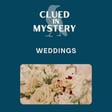
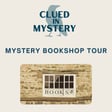
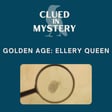
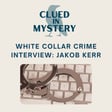
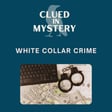
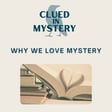
![[re-release] Dorothy L. Sayers image](https://media.zencastr.com/cdn-cgi/image/width=112,quality=85/image-files/61e1c276e3ec42007857cff9/0c9f0c0f-65b5-423a-a129-9414d2b8819e.jpg)
![[Re-release] Christie's Characters: Harley Quin image](https://media.zencastr.com/cdn-cgi/image/width=112,quality=85/image-files/61e1c276e3ec42007857cff9/19b66ded-f629-44f5-8280-f8a4afd4697c.jpg)
![[Re-release] Magic and Mystery with Tom Mead image](https://media.zencastr.com/cdn-cgi/image/width=112,quality=85/image-files/61e1c276e3ec42007857cff9/bf587b93-b2a8-41f6-af97-4772e2c0caa2.jpg)
